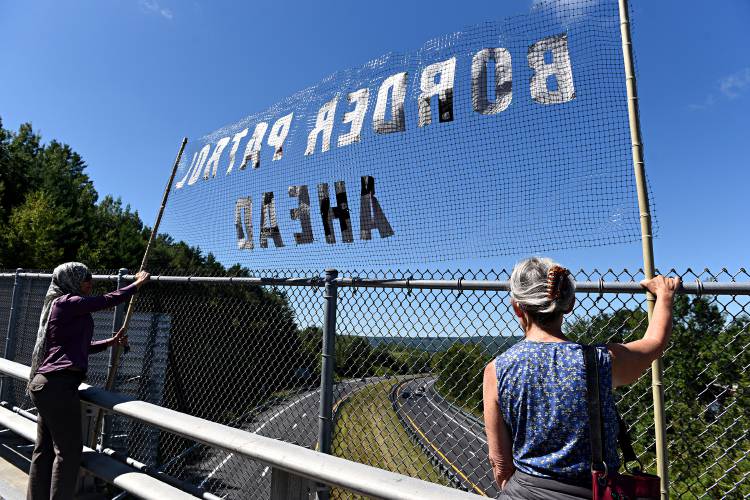Editorial: Attention on illegal border crossings misplaced

Asma Elhuni, left, of White River Junction, Vt., holds a sign with Suzanne Serat, of Hanover, N.H., over I-89 south in Lebanon, N.H., on Sept. 5, 2019. The sign alerts drivers that a Border Patrol check point is ahead of them on the interstate. (Valley News - Jennifer Hauck) Copyright Valley News. May not be reprinted or used online without permission. Send requests to permission@vnews.com. Jennifer Hauck
| Published: 06-06-2023 1:03 PM |
Gov. Chris Sununu wants to spend $1.4 million of taxpayer money to secure New Hampshire’s northern border with Canada — from whom or what, we’re not exactly sure. Apparently neither is he.
His plan comes in response to a purported increase in illegal border crossings. U.S. Customs and Border Protection has said that in the last three months of 2022, there was a 743% increase in border apprehensions and encounters in the Swanton, Vt., Sector, of which New Hampshire is a part, compared with the same period in the prior year. Moreover, the agency said, 367 apprehensions and encounters were recorded in January, more than in the previous 12 Januaries combined.
In a March 13 letter to Homeland Security Secretary Alejandro Mayorkas, Sununu alluded to “the pressing issues at our northern border“; “an alarming rise in border crossings“; and “the humanitarian crisis facing our borders.”
By way of context, if the record pace of January were to continue all year, the total would be about 4,400, which is much more like a trickle than a wave of illegal immigration. This is not to mention that the New Hampshire border with Canada constitutes only 58 of the 295 miles of the Swanton Sector, which also includes the entire state of Vermont and Clinton, Essex, Franklin, St. Lawrence and Herkimer counties in New York. And it’s unclear whether the CBP statistics cover only border encounters or the whole sector, which penetrates deep into New England.
Nonetheless, the governor has proposed creating the Northern Border Alliance to beef up patrols along the border. The state police would get nearly $620,000 for overtime, training and equipment purchases, while the remaining $816,000 would be available to other state, county and local law enforcement agencies to cover overtime costs related to border patrols.
The New Hampshire House properly laughed this proposal out of the General Court during its budget deliberations, but the Senate is keeping it alive for the moment.
We urge senators to reflect on this a little more, because when the American Civil Liberties Union of New Hampshire filed a Right-to-Know request with the governor’s office and the state Department of Safety seeking state-specific data for New Hampshire border crossings, they responded that they didn’t have any. And Department of Safety Commissioner Robert Quinn told Fox News viewers on March 27 that the state had seen a “slight increase” in border crossings.
Nothing if not persistent, the ACLU then took its data request to U.S. Customs and Border Protection, which declined to provide any state-specific numbers. Now the ACLU has filed a federal lawsuit seeking the information, in which it notes that WMUR reported that, in fact, there were no illegal border crossings recorded in New Hampshire between October 2022 and January 2023 — presumably based on information provided by the CBP.
Article continues after...
Yesterday's Most Read Articles
 Football helmet maker buys Lebanon’s Simbex
Football helmet maker buys Lebanon’s Simbex
 James Parker granted parole for his role in Dartmouth professors’ stabbing deaths
James Parker granted parole for his role in Dartmouth professors’ stabbing deaths
 Zantop daughter: ‘I wish James' family the best and hope that they are able to heal’
Zantop daughter: ‘I wish James' family the best and hope that they are able to heal’
 Kenyon: Dartmouth alumni join union-busting effort
Kenyon: Dartmouth alumni join union-busting effort
 Parker up for parole more than 2 decades after Dartmouth professor stabbing deaths
Parker up for parole more than 2 decades after Dartmouth professor stabbing deaths
 Through new school partnerships, CRREL seeks to educate young scientists
Through new school partnerships, CRREL seeks to educate young scientists
(This stonewalling by CBP has a familiar ring. After it set up checkpoints on Interstate 91 in Hartford in the wake of the 9/11 attacks, the Valley News sought to no avail a breakdown of apprehensions. The Boston Globe eventually reported that not a single suspected terrorist was detained in Vermont between 2000 and 2005.)
What seems clear to us is that Sununu had no factual basis for proposing to expend state and local law enforcement resources, which are already stretched thin, on enforcing immigration law, which is the sole province of the federal government. It is also ironic that he would do so after the Legislature passed a law last year prohibiting state and local agencies from enforcing federal gun laws and regulations that are not also incorporated into New Hampshire law.
It is doubly ironic that while this has been playing out, CBP has settled a 2020 lawsuit brought by the ACLU over checkpoints conducted in Woodstock, N.H., in 2017, which resulted in unconstitutional searches and seizures and the arrests of several American citizens on minor drug charges — although no one was charged with illegally crossing the Canadian border. The agency has agreed to refrain from setting up checkpoints in Woodstock anytime before Jan. 1, 2025.
In the face of all this, the inference can be drawn that Sununu’s goal was not necessarily to secure the northern border but rather to secure his right flank in a potential Republican presidential primary, where no candidate has a chance of success without anti-immigration bona fides.
His letter in March to the Homeland Security secretary reeks of cynical political grandstanding, castigating the Biden administration for placing a moratorium on agreements that delegate certain federal immigration enforcement functions to the states.
Sununu’s decision on making a bid is due soon. If he opts out, maybe he will just forget the whole border thing and concentrate on addressing the state’s real humanitarian crisis — homelessness.

 A Yankee Notebook: An inevitable and terminal move
A Yankee Notebook: An inevitable and terminal move Editorial: Gambling tarnishes America’s sporting life
Editorial: Gambling tarnishes America’s sporting life By the Way: A white nationalist’s many mistruths
By the Way: A white nationalist’s many mistruths Column: The age-old question of what to read
Column: The age-old question of what to read
